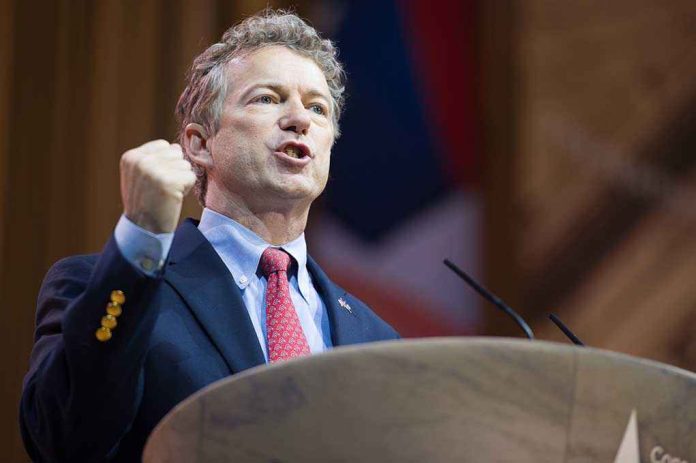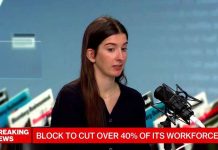
Senator Rand Paul is demanding Congress finally pull back the curtain on the Federal Reserve’s secretive $186 billion maneuvers—raising the stakes for transparency, accountability, and the future of American economic power.
At a Glance
- Senator Rand Paul calls for a full congressional audit of the Federal Reserve, spotlighting $186 billion in unaccounted actions.
- The Federal Reserve’s decision-making has remained largely insulated from public and congressional scrutiny for decades.
- Debate intensifies over balancing Fed independence with real accountability to taxpayers and elected officials.
- Economists warn increased oversight could threaten monetary policy efficacy, while transparency advocates demand sunlight on Fed actions.
Rand Paul’s Push: Why Americans Deserve to See Inside the Fed
The call for a full audit of the Federal Reserve has never been louder or more justified. Senator Rand Paul, echoing the frustration of millions of Americans tired of seeing their savings eroded and their livelihoods threatened by inflation, has reignited his crusade for oversight. Paul’s demand is simple: “It’s time for us to know how the Fed makes its decisions.” After years of the Fed operating in the shadows, especially during the massive interventions of the 2008 crisis and the COVID-19 pandemic, Americans want answers about how unelected bureaucrats can move $186 billion with barely a hint of oversight or explanation. It’s not a Democrat or Republican issue—it’s a matter of common sense and constitutional accountability.
Rand Paul: 186 Billion Reasons to Audit the Fedhttps://t.co/fYd8GebDnZ
— PJ Media (@PJMedia_com) July 28, 2025
Paul’s push comes at a moment when the American middle class is still battling the fallout of reckless government spending and the Fed’s opaque maneuvers on interest rates and asset purchases. The Federal Open Market Committee (FOMC), whose decisions can make or break the economy for everyday citizens, has become the very symbol of government power without transparency. For years, the Fed has released vague post-meeting statements and minutes—always after the fact. The rationale behind their decisions, the real conversations, and the pressure points remain hidden. Meanwhile, working Americans deal with the consequences in real time: higher prices, rising borrowing costs, and an economy that feels rigged against them.
How the Fed Became an Untouchable Power Center
The Federal Reserve was created back in 1913 to stabilize the banking system and manage currency. Over the decades, it evolved from a network of regional banks to a centralized powerhouse, especially after the Banking Acts of 1933 and 1935 established the FOMC and put most monetary tools under the direct control of the Board of Governors. This structure gave the Fed enormous independence, and by design, shielded its internal deliberations from Congress and the public. It’s a setup that has drawn periodic calls for transparency—especially after economic disasters or controversial policy swings—but the institution has always managed to keep its real decision-making processes largely out of reach. Congressional efforts to audit or oversee the Fed have come and gone, often led by Senator Paul and his father before him, but the institution remains a black box. Americans are left to trust that the unelected technocrats running the show are acting in their best interest—a hard sell as inflation chews through paychecks and savings accounts.
The power dynamics are clear: The Fed claims it needs independence to do its job, but Congress has the constitutional authority to amend its charter and demand accountability. The financial sector and the general public, meanwhile, are caught in the crossfire—left to interpret cryptic Fed statements while living with the consequences of decisions made in secret. The stakes have only grown as the Fed’s actions now ripple through every corner of the economy, from Wall Street to Main Street.
Debating Oversight: Independence or Accountability?
Senator Paul’s renewed push for a Fed audit comes as the FOMC faces unprecedented scrutiny. Persistent inflation, rate hikes, and the Fed’s sometimes baffling communication style have convinced many Americans that the old ways aren’t working. Despite increased calls for transparency, no major legislation has passed in 2025 to require real-time disclosure or open the books on Fed operations. The debate in Washington is fierce. Economists warn that too much political interference could undermine the Fed’s ability to control inflation or stabilize employment. Yet, transparency advocates argue that without sunlight, the Fed is free to make decisions that impact every American family—without any real check from Congress or the taxpayers footing the bill.
Congressional hearings are ongoing, and proposals for more oversight pile up. The only thing everyone seems to agree on is that the status quo—where the most powerful monetary institution in the world can operate with minimal accountability—is indefensible. The pressure is on lawmakers to find a balance that protects both the economy and the public trust.
The Fallout: What’s at Stake for Americans and the Constitution
The implications of Paul’s campaign for a Fed audit run deep—and not just for Wall Street. Increased transparency could lead to more market stability, better public understanding, and a restoration of the constitutional checks and balances that have been eroded by decades of bureaucratic creep. On the other hand, if Congress pushes too far, there’s a risk of politicizing monetary policy and undermining the Fed’s credibility with global markets. The financial industry, the broader public, and the Fed’s own staff are all watching closely as the battle lines are drawn. For now, though, the most important question remains unanswered: Who, exactly, is watching the watchers? The American people, after years of being told to trust the experts, are demanding a different answer—and Senator Rand Paul is making sure that demand is heard loud and clear.
As the debate rages on, one thing is certain: Americans have had enough of secret deals and government overreach. The Constitution demands accountability, and it’s time Congress delivered.
Sources:
FRASER: Timeline of Monetary Policy History
Federal Reserve: FOMC Historical Materials


